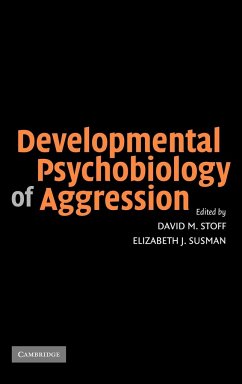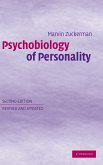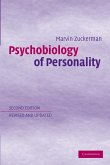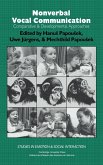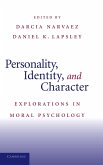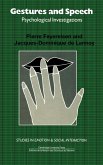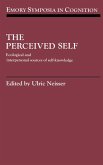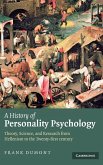Short description/annotation
This book presents some psychobiological studies that trace the development of aggression.
Main description
This book is the outgrowth of a memorial conference to honor the scientific contributions of Robert B. Cairns, an internationally recognized interdisciplinary developmental scientist. It is organized around research themes that were an integral part of Dr Cairns' theories and research: neural and developmental plasticity; brain-behavior bidirectionality; gene-environment interactions. Throughout this book, these themes are linked together by employing animal models and clinical investigations through multiple levels of analysis approach to understanding the origins, development, desistance and prevention of aggression. These studies will add to the compendium of basic knowledge on the developmental psychobiology of aggression and will aid in the ultimate translation of this knowledge to clinical and community settings. This book hopes to foster the legacy of Robert B. Cairns to facilitate the theoretical development and research of a new generation of developmental scientists dedicated to relieving the tragic consequences of aggression on the individual and society.
Table of contents:
Foreword Felton Earls MD; 1. An integrated perspective on contemporary psychobiological research in aggression David M. Stoff and Elizabeth J. Susman; 2. Animal studies on inappropriate aggressive behavior following stress and alcohol exposure in adolescence Craig F. Ferris; 3. Touch deprivation and aggression against self among adolescents Tiffany Field; 4. Social deprivation, social-emotional behavior, and the plasticity of dopamine function Paul L. Gendreau and Mark H. Lewis; 5. Running head: identifying pathways for adjustment Julia A. Graber, Jeanne Brooks-Gunn and Andrea B. Archibald; 6. Toward an integrative account of the development of aggressive behavior Kathryn E. Hood; 7. Life-course persistent and adolescent-limited antisocial males: longitudinal follow-up to adulthood Terrie E. Moffitt and Avshalom Caspi; 8. The interaction of biological and social measures in the explanation of antisocial and violent behavior Adrian Raine; 9. How gene-environment interactions shape the development of impulsive aggression in Rhesus monkeys Stephen J. Suomi; 10. A biocultural life history approach to the developmental psychobiology of male aggression Carol M. Worhman and Ryan A. Brown; 11. Intersections of biology and behavior in young children's antisocial patterns: the role of development, gender and socialization Carolyn Zahn-Waxler and Barbara Usher; 12. Psychobiology of aggressive behavior: a synthesis and reconsideration Elizabeth J. Susman and David M. Stoff.
Hinweis: Dieser Artikel kann nur an eine deutsche Lieferadresse ausgeliefert werden.
This book presents some psychobiological studies that trace the development of aggression.
Main description
This book is the outgrowth of a memorial conference to honor the scientific contributions of Robert B. Cairns, an internationally recognized interdisciplinary developmental scientist. It is organized around research themes that were an integral part of Dr Cairns' theories and research: neural and developmental plasticity; brain-behavior bidirectionality; gene-environment interactions. Throughout this book, these themes are linked together by employing animal models and clinical investigations through multiple levels of analysis approach to understanding the origins, development, desistance and prevention of aggression. These studies will add to the compendium of basic knowledge on the developmental psychobiology of aggression and will aid in the ultimate translation of this knowledge to clinical and community settings. This book hopes to foster the legacy of Robert B. Cairns to facilitate the theoretical development and research of a new generation of developmental scientists dedicated to relieving the tragic consequences of aggression on the individual and society.
Table of contents:
Foreword Felton Earls MD; 1. An integrated perspective on contemporary psychobiological research in aggression David M. Stoff and Elizabeth J. Susman; 2. Animal studies on inappropriate aggressive behavior following stress and alcohol exposure in adolescence Craig F. Ferris; 3. Touch deprivation and aggression against self among adolescents Tiffany Field; 4. Social deprivation, social-emotional behavior, and the plasticity of dopamine function Paul L. Gendreau and Mark H. Lewis; 5. Running head: identifying pathways for adjustment Julia A. Graber, Jeanne Brooks-Gunn and Andrea B. Archibald; 6. Toward an integrative account of the development of aggressive behavior Kathryn E. Hood; 7. Life-course persistent and adolescent-limited antisocial males: longitudinal follow-up to adulthood Terrie E. Moffitt and Avshalom Caspi; 8. The interaction of biological and social measures in the explanation of antisocial and violent behavior Adrian Raine; 9. How gene-environment interactions shape the development of impulsive aggression in Rhesus monkeys Stephen J. Suomi; 10. A biocultural life history approach to the developmental psychobiology of male aggression Carol M. Worhman and Ryan A. Brown; 11. Intersections of biology and behavior in young children's antisocial patterns: the role of development, gender and socialization Carolyn Zahn-Waxler and Barbara Usher; 12. Psychobiology of aggressive behavior: a synthesis and reconsideration Elizabeth J. Susman and David M. Stoff.
Hinweis: Dieser Artikel kann nur an eine deutsche Lieferadresse ausgeliefert werden.

